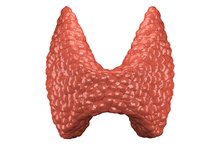What does fact checked mean?
At Healthfully, we strive to deliver objective content that is accurate and up-to-date. Our team periodically reviews articles in order to ensure content quality. The sources cited below consist of evidence from peer-reviewed journals, prominent medical organizations, academic associations, and government data.
The information contained on this site is for informational purposes only, and should not be used as a substitute for the advice of a professional health care provider. Please check with the appropriate physician regarding health questions and concerns. Although we strive to deliver accurate and up-to-date information, no guarantee to that effect is made.
What Does Low TSH Level Mean?
TSH, or thyroid stimulating hormone, is secreted by the pituitary gland and stimulates the thyroid gland to secrete two other hormones: T3 and T4. When a blood test determines that TSH is low, it means that the pituitary is releasing less TSH in an attempt to balance levels of T3 and T4 in the body.
Hyperthyroidism
Hyperthyroidism is the term used to describe an under-active thyroid, or a thyroid that does not secrete enough T3 and T4. In this condition, TSH levels are elevated because the pituitary begins secreting more of the hormone in an attempt to boost thyroid function 2.
Causes for Low TSH Levels
What Does a High TSH Level Mean?
Learn More
Hyperthyroidism is most commonly caused by some form of damage to the thyroid gland itself, such as a growth or tumor, an infection or inflammation. Occasionally, hyperthyroidism may be caused by a pituitary gland that does not function properly.
Symptoms of Low TSH
The most common symptoms of low TSH include:
- sweating excessively
- intolerance to heat
- shaking or tremors
- increased heart rate
- anxiousness
- fatigue
- abnormal weight loss
Treatment of Hyperthyroidism
What Is Considered a Low TSH Level?
Learn More
Treatment of hyperthyroidism varies due to the cause of the condition; however, it most commonly includes taking anti-thyroid drugs daily, which inhibit the production of T3 and T4. In severe cases, treatment may include removal or partial removal of the thyroid gland.
Controlling Thyroid Levels
In order to maintain a balance among T3, T4 and TSH, it is important to maintain regular treatment from a doctor and to have TSH levels checked regularly.
Related Articles
References
- MedlinePlus: TSH Test
- EndocrineWeb: Thyroid Gland Function
- Brent GA. Mechanisms of Thyroid Hormone Action. The Journal of Clinical Investigation. 2012;122(9):3035–3043. doi:10.1172/JCI60047.
- Jonklaas J, Bianco AC, Bauer AJ, et al. Guidelines for the Treatment of Hypothyroidism: Prepared by the American Thyroid Association Task Force on Thyroid Hormone Replacement. Thyroid. 2014;24(12):1670–1751. doi:10.1089/thy.2014.0028.
- Mullur R, Liu Y-Y, Brent GA. Thyroid Hormone Regulation of Metabolism. Physiological Reviews. 2014;94(2):355–382. doi:10.1152/physrev.00030.2013.
- Ross DS, Burch HB, Cooper DS, et al. 2016 American Thyroid Association Guidelines for Diagnosis and Management of Hyperthyroidism and Other Causes of Thyrotoxicosis. Thyroid. 2016;26(10):1343–1421. doi:10.1089/thy.2016.0229.
Writer Bio
Liz Eubanks has been working as a writer and health researcher since 2006. Eubanks has a master's degree in social work and Bachelor of Arts degrees in international studies, Latin American studies and Spanish. Additionally, Eubanks has worked as a licensed massage therapist, has a certificate in holistic nutrition and is a devout yogi.







